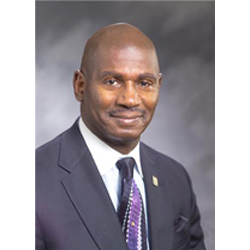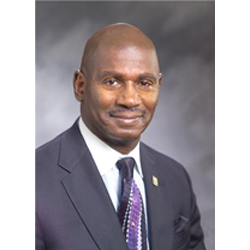
Dr. Leonard Weather Jr., R.Ph., M.D. is the 111TH President of the National Medical Association.
The National Medical Association is dedicated to reducing and eliminating disparities in health and improving the lives of our patients, their families, and their communities. As the nation’s oldest and largest organization representing African American physicians and health professionals in the United States, NMA has led the fight for better medical care and opportunities for all Americans, with a strong focus on health issues related to minority populations and the medically underserved.
It is exactly this commitment to the health of our communities, and to reducing the health disparities they face, that has inspired the NMA to join the Safer Chemicals, Healthy Families campaign. A growing body of scientific evidence has now confirmed what many of our members have suspected for years: toxic chemicals in everyday products, and in our food, air and water, are harming the health of women, men and children. Low income communities and communities of color bear an unequal share of this toxic legacy.
This small town of approximately 400 households is besieged by 14 industrial facilities that annually dump more than 4 million pounds of toxic chemicals
As a long-time resident of Louisiana, I know of many towns along Louisiana’s Gulf coast area that are overburdened with more than their “fair” share of environmental contamination and resulting health problems. These towns, often referred to as “hot spots,” are located next to petrochemical plants and toxic waste dumps. Perhaps no town in America better illustrates the impact of environmental contamination and the resulting health issues better than Mossville, Louisiana. Mossville is a predominantly African-American community and many families have lived there for generations. This small town of approximately 400 households is besieged by 14 industrial facilities that annually dump more than 4 million pounds of toxic chemicals into the local community. The immediate area has the largest concentration of vinyl plastic manufacturers in the U.S., as well as a coal-fired power plant, oil refineries, and other chemical production facilities. Residents have been found to have elevated levels of cancer-causing and endocrine-disrupting chemicals in their bodies, including levels of dioxin at 3 times the national average. Residents also report high rates of reproductive and other chronic and acute health problems.
Over the years, I have seen a rise in endometriosis among my patients in Louisiana. Endometriosis is a condition in which tissue that behaves like the cells lining the uterus (endometrium) grows in other areas of the body. This condition is not only painful, but can sometimes lead to infertility in women. While the causes of this condition vary, there is mounting evidence linking this condition to toxic chemicals like polychlorinated biphenyl (PCBs) and dioxins. Although the EPA banned PCBs from being commercially produced in 1979, PCBs are allowed to be present in products and materials produced before the 1979 PCB ban, and, in turn, continue to be ubiquitous in our lives. Dioxins are another toxic health nightmare and are often times the byproducts of industrial manufacturing processes.
Endometriosis isn’t the only health problem facing our patients that has been linked to toxic chemicals. My colleagues and I are seeing more and more children born with congenital malformations and low birth weight. Birth defects like hypospadias (a malformation of the genital tract in boys) has been linked to phthalates, an endocrine disrupting chemical that is effectively unregulated, and can be found in the homes, and bodies, of nearly every American.
As a physician I do my best to help my patients make healthy decisions, including reducing exposure to toxic chemicals. Unfortunately, no matter how many tips I give to my patients for keeping these toxic intruders out of their bodies, it is impossible to avoid them entirely.
That’s why the NMA is taking on the root cause of these harmful, toxic products: outdated and inadequate laws that fail to protect our families. We stand shoulder to shoulder with other health care providers, environmental health and justice groups, reproductive health groups, and learning disability advocacy communities in calling for national reform to require companies to prove that chemicals in our everyday products are safe before they end up on store shelves and in baby nurseries. We call on Congress to protect workers from dangerous chemicals in the workplace and to address the heartbreaking legacies faced by communities living with toxic manufacturing sites in their backyards.
The Senate has already taken the first step by introducing the Safe Chemicals Act, and it is now up to us, physicians, health care providers, and concerned citizens to see that chemical policy reform is made a reality. NMA is proud to join a growing list of organizations committed to this cause, and I urge other medical organizations and health care provider groups to stand beside us. Together, we can build a healthier world.




